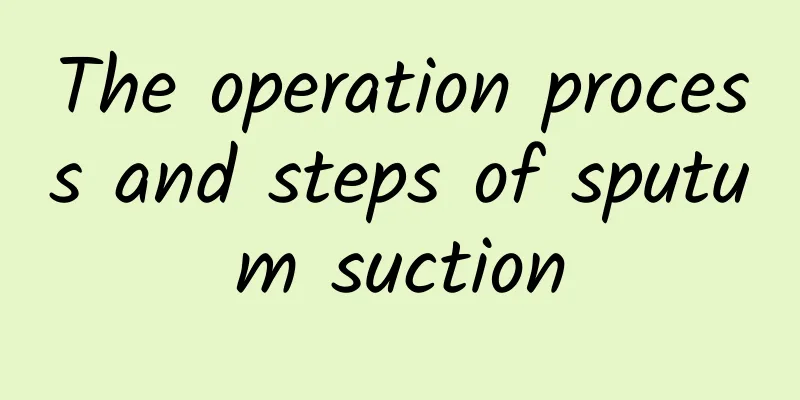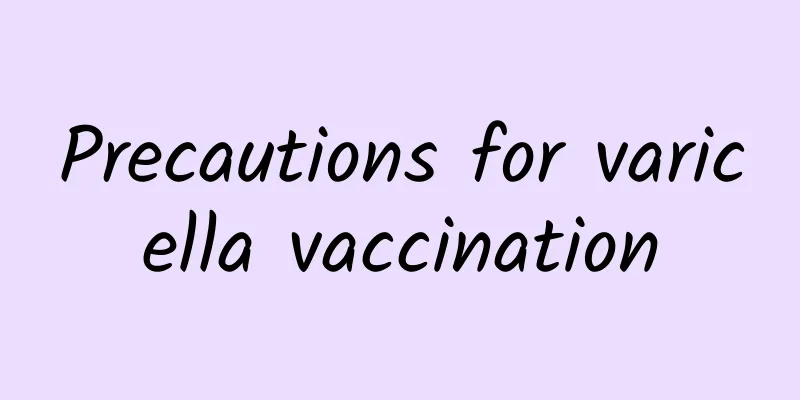The operation process and steps of sputum suction

|
Many people have seen suction machines in hospitals. Some people who have undergone surgery may have sputum to be discharged, but because they cannot move their bodies freely, they use suction machines to solve this problem. If you want to use a suction machine at home, you must master the operation process and steps of suction - the detailed steps of suction. The following is a detailed introduction to the technology and operation steps of the suction machine. You can learn it if you need it. 1. Purpose Sputum suctioning is a technique that uses negative pressure to suck out sputum and aspirated vomitus from the trachea through a catheter to keep the airway open and relieve patients from breathing difficulties, atelectasis, and lung infections caused by tracheal obstruction. It is mostly used for critically ill, elderly, comatose, or those who have not woken up after general anesthesia, who cannot cough up sputum or accidentally inhale vomit into the trachea due to weak cough or slow cough reflex, epiglottis insufficiency, etc. 2. Evaluation 1. Patient's condition: critically ill, elderly, comatose, weak cough or slow cough reflex, epiglottal insufficiency, aspiration of vomit, etc. 2. Local conditions: whether there are any abnormalities in the oral and nasal cavity, sputum properties, color, viscosity, amount, etc. 3. The patient's breathing and sputum obstruction to determine whether sputum suction is needed 3. Use Treatment tray, treatment towel, 2 treatment bowls (as needed), disposable suction tube (selected according to the condition), a bottle of normal saline, a set of central negative pressure device and negative pressure bottle (containing 100~200ml disinfectant), an empty bottle tied with a rope or net, a small red bucket (for suction tube), an opener (as needed), a tongue depressor, a tongue forceps (as needed), a bottle of endotracheal instillation solution (prepare according to doctor's orders), and a sterile syringe (5~10ml). Lay out a sterile nursing tray in the treatment room, mark the time, pour sterile saline into the treatment bowl (the oral and nasal suction bowl is placed close to the patient) and change it once a day. V. Implementation Procedure 1. Assess the patient's breathing and sputum obstruction to determine whether sputum suction is needed. Explain the purpose and method of sputum washing to the patient or family members. Turn the patient over and pat his back to remove sputum. 2. Prepare all the necessary materials. Tie the bottle to the bedside. Connect the pressure gauge to the central negative pressure system. Install the negative pressure bottle. Connect the disposable suction tube. Turn on the switch. Check whether the performance of the suction device is good. Put the suction tube head into the empty bottle. Open the sterile tray. Check the suction tube. Open the package and connect it to the suction device. Connect the suction tube. Turn on the negative pressure. Try to suck a small amount of normal saline. 3. Turn the patient's head toward the operator and open his mouth. Fold the end of the catheter with one hand. Use sterile forceps to hold the tip of the suction catheter and insert it into the oral pharynx. Turn on the negative pressure to first suck out the secretions in the oral pharynx. Then replace the suction tube. When the patient inhales, insert the suction tube through the throat into the trachea to a certain depth (about 15 ml). Pull the suction tube upward from the deep, rotate it left and right, and suck out the sputum. Each suction should not exceed 10-15 seconds, and the total time of continuous suction should not exceed 3 minutes. 4. After the suction tube is pushed out, it should be suctioned and flushed with normal saline. 5. For patients on ventilators, the oxygen concentration should be increased before and after suctioning. Generally, pure oxygen should be given for 3 minutes. Vital signs should be observed before, during and after suctioning. If there is any discomfort, the operation should be stopped immediately. During suctioning, wipe off the secretions at any time, observe the changes in respiratory rate before and after suctioning, pay attention to the properties, amount and color of the aspirated material, and keep records. 6. After suctioning, turn off the suction switch and put the suction tube into a small red bucket for disinfection. Insert the suction tube into the empty bottle. 7. Observe whether the patient's breathing has improved, help the patient to take a comfortable lying position, and organize items. |
<<: What are the dangers of suctioning sputum in children?
Recommend
Selective proteinuria
Many friends don’t know what selective urine prot...
What happens if the tooth remains are not removed?
In many cases, teeth will have residual roots, su...
What to do if your asthma is caused by a cold
Most people just sneeze, have a runny nose, fever...
Opening up the Ren and Du Meridians is a new experience
Anyone who has read martial arts novels before wi...
How to determine if your baby has colic?
Colic is a common phenomenon in newborns. We all ...
How to treat men with cold body
Cold body is not exclusive to women. Some men are...
What causes swollen tonsils?
Enlarged tonsils are an abnormal disease phenomen...
What are the Chinese patent medicines for treating impotence?
Impotence is quite common in life, especially in ...
Side Effects of Emblica
Emblica officinalis is a very high-quality Chines...
Symptoms of seizures
When it comes to the name of convulsion, everyone...
How is rheumatoid arthritis treated? Rheumatoid therapy
Rheumatoid arthritis is becoming more and more co...
What is enuresis? You should know the pathological symptoms.
Enuresis is a disease that occurs in children ove...
Acute gastroenteritis vomiting yellow water
As more and more people have been suffering from ...
How much does 1g of placenta cost?
We all should know the function of the placenta. ...
Can fresh aloe vera remove scars?
Everyone should be familiar with aloe vera. It is...









